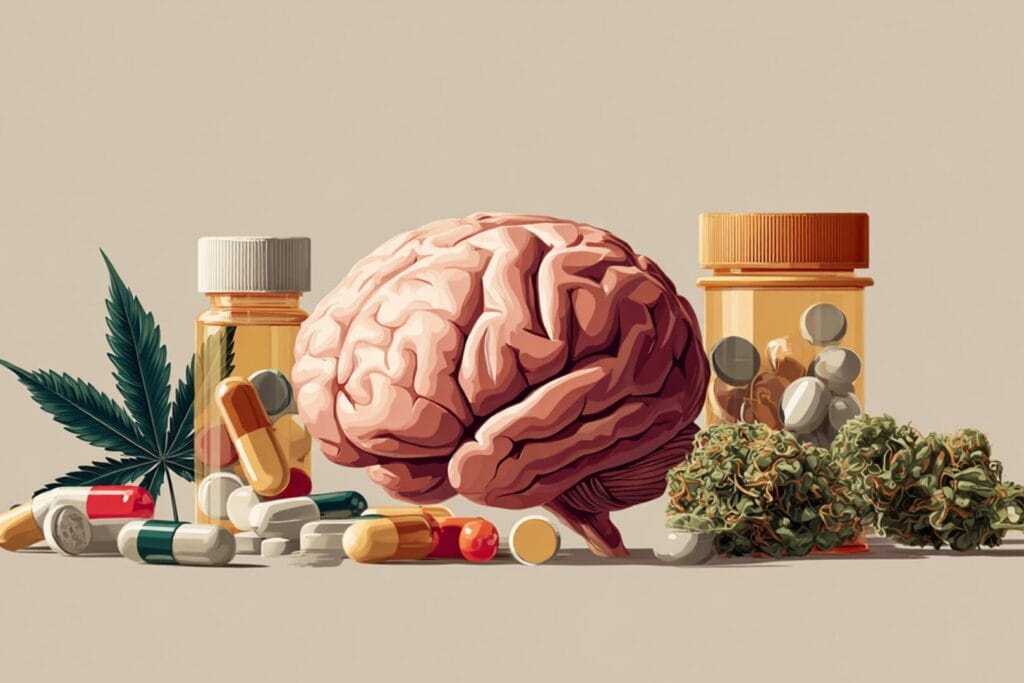Does rehab really work?
It’s a question that crosses the mind of many people, whether they’re considering it for themselves, a friend, or a loved one. The idea of entering rehab can feel overwhelming, and with so many mixed stories out there—some about amazing recoveries and others about frustrating relapses—it’s natural to be skeptical.
Rehab isn’t a magic bullet, a quick fix or a one-size-fits-all solution. But that doesn’t mean it doesn’t work. Rehab can be incredibly effective, but its success isn’t just about checking into a facility. It’s about the journey, commitment, and a range of factors that all play a part in the process.
From personal commitment to the quality of care, we’ll explore what really makes rehab work and, in some cases, what can make it fall short.
Understanding Rehab: More Than Just Detox
When most people think of rehab, the first that comes to mind is detox—getting the substances out of your system and starting fresh. While detoxing is a critical first step in the recovery process, it’s just the beginning.
Rehab is about more than cleansing the body—it’s about healing the whole person.
At its core, rehab is a comprehensive approach to recovery. It’s a structured program to help someone not just stop using drugs or alcohol but help them understand the underlying issues contributing to addiction. Rehab involves a combination of medical care, therapy, education and support. It’s all aimed at equipping people with the tools needed to rebuild their lives.
The goal isn’t just achieving sobriety but maintaining it in the long run.
Addiction doesn’t just affect the body. It touches every part of a person’s life—mentally, emotionally and spiritually. A holistic rehab approach recognizes this and addresses the whole person, not just the symptoms of addiction.
In a holistic rehab program, treatment plans go beyond traditional methods like therapy and medications. They include mindfulness practices, yoga, nutritional counseling, art therapy and more.
These are elements to help individuals reconnect with themselves, manage stress, and find a sense of balance and well-being to support their recovery.
By treating the mind, body and spirit, holistic rehab creates a solid foundation for a healthier and more fulfilling life overall post-rehab.
Exploring Various Treatment Modalities
Addiction treatment is highly individualized, and selecting the right approach is crucial for long-term success. Different programs and therapies address unique challenges, ensuring that each person receives the support they need.
Inpatient vs. Outpatient:
- Inpatient Rehab – A structured, immersive environment with 24/7 medical and emotional support.
- Outpatient Rehab – Flexible treatment for those who need therapy while managing daily responsibilities.
Alternative Treatment Options:
- Partial Hospitalization Programs (PHPs) – A balance between inpatient and outpatient care with structured daytime treatment.
- Intensive Outpatient Programs (IOPs) – A step down from PHPs, offering therapy sessions multiple times a week.
Therapy-Based Approaches:
- Cognitive Behavioral Therapy (CBT) – Helps individuals identify and change negative thought patterns that contribute to addiction.
- Dialectical Behavior Therapy (DBT) – Focuses on emotional regulation and distress tolerance for those struggling with intense emotions.
- Medication-Assisted Treatment (MAT) – Combines FDA-approved medications with counseling for opioid and alcohol addiction.
Choosing the right modality is key to recovery, as it ensures individuals receive the appropriate level of care and support for their unique journey.
Key Factors Influence Rehab Effectiveness
The effectiveness of rehab isn’t just about checking into a facility and going through the motions. It’s about a combination of factors working together to support lasting recovery. Some of the elements that can have an impact on the rehab experience and how effective it is overall include:
- Personal commitment: One of the first and perhaps most critical factors is individual commitment to recovery. Rehab can provide all the tools and support in the world, but if someone’s not committed to making a change, it diminishes the likelihood of success. Recovery is challenging and requires a deep, personal desire to overcome addiction. The commitment involves embracing the process and being open to change.
- Support systems: No one should go through recovery alone. Strong support systems are essential during and after rehab. During rehab, family involvement can provide emotional support and help rebuild trust and relationships. Peer support groups within the rehab setting also offer shared understanding and a motivating sense of community.
- Aftercare and ongoing support: The journey doesn’t end after a rehab program ends. Ongoing support is vital to maintain long-term sobriety. Aftercare programs like support groups, sober living environments and ongoing counseling provide the continued structure and guidance needed to navigate life after rehab. These programs help people apply what they’ve learned in rehab to real-world situations, cope with triggers and stay committed to recovery.
Overall, rehab works best when there is a strong personal commitment, a high-quality program, robust support systems and comprehensive aftercare.
Building a Strong Support Network: Resources for Lasting Recovery
Recovery doesn’t end when rehab does. Ongoing support systems play a critical role in preventing relapse and maintaining long-term sobriety. Various resources provide encouragement, guidance, and accountability.
Community-Based Support Groups:
- Alcoholics Anonymous (AA) & Narcotics Anonymous (NA) – 12-step programs offering peer support and structured recovery steps.
- SMART Recovery – A non-religious alternative that emphasizes self-empowerment and science-based strategies.
Rehab-Supported Aftercare Programs:
- Alumni Networks – Many rehab centers offer continued group therapy, mentorship, and sober community events.
- Relapse Prevention Plans – Structured strategies designed to help individuals recognize and manage triggers.
Virtual and Online Support:
- Online Meetings & Forums – Digital platforms offering remote access to support groups and counseling.
- Mental Health Apps – Mobile tools that provide guided meditation, recovery tracking, and therapy resources.
Engaging with these resources can make the difference between short-term sobriety and lasting recovery, providing a sense of community and continued guidance.
Why Treatment Duration Matters
The length of time spent in treatment directly impacts recovery success. While short-term rehab offers immediate stabilization, extended treatment is often necessary to create lasting behavioral change.
Why Longer Treatment Leads to Better Outcomes:
- More time for behavioral therapy – Developing healthy coping skills and addressing underlying issues takes time.
- Increased accountability and structure – Longer programs reinforce routines that support sobriety.
- Higher success rates – Studies show that at least 90 days of treatment significantly improves long-term recovery outcomes.
Extended Care Options:
- Sober Living Homes – Transitional environments offering continued support before full independence.
- Step-Down Programs – Gradual reduction of treatment intensity to ease reintegration into daily life.
Recovery is not just about completing a program; it’s about committing enough time to build a strong, relapse-resistant foundation. Investing in a longer treatment duration increases the likelihood of sustained sobriety and a healthier future.
Addressing Common Misconceptions
When it comes to rehab, there are a lot of misconceptions floating around that can create unrealistic expectations or discourage people from seeking much-needed help.
Myth #1: One-Size-Fits-All
One of the biggest misconceptions is that rehab is a one-size-fits-all solution. The truth is addiction and recovery are very personal, and what works for one person may not work for another.
A successful rehab program must be tailored to each individual’s specific needs, goals and circumstances.
That means considering factors like the substance used and the length of addiction, underlying mental health issues, and personal preferences for treatment.
A personalized approach ensures that each person gets the right therapies, support, and care to give them the best chance at recovery.
Myth #2: Rehab is a Quick Fix
Another common myth is that rehab is a quick fix—a few weeks into the program, and you’re cured. Unfortunately, this isn’t the case.
Recovery is a long-term process requiring ongoing effort and commitment.
Rehab can provide a strong foundation for recovery, but it’s not a magic cure.
The potential for relapse is a reality, and it’s important to realize recovery often involves setbacks.
What matters is how you respond to those and continue to move forward.
True recovery is about building new habits, coping strategies and a support network to help you maintain sobriety over the long haul.
Myth #3: Rehab is Only for the Most Severe Cases
Some people believe rehab is only needed for those with severe addiction issues, and that’s not true.
Rehab can be beneficial at various stages of substance use, whether someone is struggling with a mild dependency or has been battling addiction for years.
Early intervention can prevent substance use from escalating into a more serious problem. For those with long-term or severe addiction, rehab offers intensive support needed to break the cycle.
It’s never too early or late to seek help, and rehab can be a valuable tool for anyone looking to change their life.
Final Thoughts
Rehab is more than just a place to detox. It’s a comprehensive journey to recovery.
While rehab’s effectiveness depends on many factors, including personal commitment, the quality of the program, strong support systems and ongoing aftercare, it can undoubtedly be a powerful tool. It’s a personalized, holistic approach that empowers people to rebuild their lives and maintain long-term sobriety rather than a quick fix.
If you or a loved one is considering rehab, it’s important to choose a program that truly understands the complexity of addiction, offering the right support at every step in the journey.
At San Diego Detox, we specialize in providing a holistic, personalized approach to recovery. Our team is dedicated to helping you achieve lasting sobriety in a compassionate, supportive environment. Don’t wait to take the first step. Reach out to San Diego Detox today and discover how we can help you.
Common Rehab FAQs
1. How do I know if rehab will work for me?
Rehab success depends on various factors, including personal commitment, the quality of the program, and post-treatment support. Choosing a rehab that offers individualized care, evidence-based therapies, and aftercare planning can significantly improve the chances of long-term recovery.
2. What happens if I relapse after rehab?
Relapse is a common part of the recovery journey and does not mean failure. Many people require multiple attempts before achieving long-term sobriety. The key is to seek support immediately, reassess treatment strategies, and possibly enter a relapse prevention program to strengthen coping skills.
3. Is rehab only for severe addiction cases?
No. Rehab can be beneficial for anyone struggling with substance use, whether mild or severe. Early intervention often leads to better outcomes, preventing addiction from worsening and reducing the risk of long-term consequences.
4. Can I still work or go to school while in rehab?
Yes, some treatment options, like outpatient programs and intensive outpatient programs (IOPs), allow individuals to continue working or attending school while receiving care. Virtual therapy and flexible scheduling make it possible to prioritize recovery without disrupting daily life.
5. Do luxury amenities improve rehab success rates?
Luxury amenities don’t replace evidence-based treatment, but comfortable accommodations, private spaces, and supportive environments can reduce stress and help people stay engaged in the recovery process, and understanding the benefits of luxury amenities in rehab centers can explain how these features may support long-term treatment success.
6. What kind of support will I have after completing rehab?
Most reputable rehab centers provide aftercare services, including support groups, relapse prevention plans, alumni programs, and access to counselors. Additionally, external resources like Alcoholics Anonymous (AA), SMART Recovery, and sober living homes offer ongoing support to help maintain sobriety.







